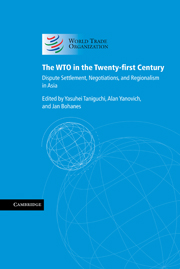Book contents
- Frontmatter
- Contents
- Notes on contributors
- Acknowledgements
- Table of dispute settlement cases and reports
- List of abbreviations
- Introduction
- PART I The WTO at Ten
- PART II Accomplishments and Future Prospects of the WTO Dispute Settlement System
- PART III Asian Perspectives on WTO Dispute Settlement
- 11 East Asia in the WTO dispute settlement mechanism
- 12 Japan's perspectives on the present Dispute Settlement Understanding negotiations
- 13 A review of some appellate decisions: law, policy, and economics in dispute settlement
- 14 Is the WTO dispute settlement mechanism important to business?
- 15 Japan's approach to the ‘use’ of the WTO: how can we achieve an effective link between business and the WTO?
- PART IV The Doha Development Agenda and Beyond
- PART V Asian Regional Integration and the Multilateral Trading System
- Index
13 - A review of some appellate decisions: law, policy, and economics in dispute settlement
from PART III - Asian Perspectives on WTO Dispute Settlement
Published online by Cambridge University Press: 05 March 2012
- Frontmatter
- Contents
- Notes on contributors
- Acknowledgements
- Table of dispute settlement cases and reports
- List of abbreviations
- Introduction
- PART I The WTO at Ten
- PART II Accomplishments and Future Prospects of the WTO Dispute Settlement System
- PART III Asian Perspectives on WTO Dispute Settlement
- 11 East Asia in the WTO dispute settlement mechanism
- 12 Japan's perspectives on the present Dispute Settlement Understanding negotiations
- 13 A review of some appellate decisions: law, policy, and economics in dispute settlement
- 14 Is the WTO dispute settlement mechanism important to business?
- 15 Japan's approach to the ‘use’ of the WTO: how can we achieve an effective link between business and the WTO?
- PART IV The Doha Development Agenda and Beyond
- PART V Asian Regional Integration and the Multilateral Trading System
- Index
Summary
Panels and the Appellate Body of the World Trade Organization (WTO) have sometimes been criticized as being too textual or literal in interpreting WTO agreements and, at the same time, as deviating too much from the texts of those agreements. These criticisms have been directed particularly at the Appellate Body because it has the power to make the final judgment on the issue in a case. Although such criticisms are not entirely unfounded, the Appellate Body has tried to be faithful to the wording of the WTO agreements and, at the same time, to accomplish the basic policy goal of those agreements. It is indeed difficult to reconcile textual or literal interpretations as mandated by the Understanding on Rules and Procedures Governing the Settlement of Disputes (DSU) and retain some flexibility in interpretation so that the dispute settlement system of the WTO can deal with the ever-evolving area of international trading relations and new issues arising thereunder.
Also, one may find that, in some cases, the holdings of the Appellate Body somehow lack economic rationale. Although the Appellate Body is not required to interpret WTO agreements according to economic principles, one might question the meaningfulness of a finding of the Appellate Body if it makes little sense economically because, after all, the WTO agreements were designed to promote good economic policy and performance in trading nations in one way or another.
In the following passages, a few important holdings of the Appellate Body will be taken up and analysed.
- Type
- Chapter
- Information
- The WTO in the Twenty-first CenturyDispute Settlement, Negotiations, and Regionalism in Asia, pp. 282 - 293Publisher: Cambridge University PressPrint publication year: 2007



